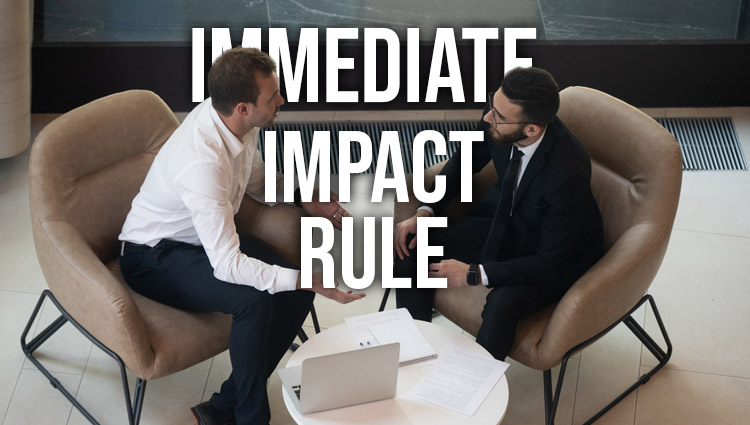Running a business doesn’t just require skills. You must also possess a high level of emotional intelligence.
For instance, most people believe that “it’s better to have loved and lost than never to have loved at all.” However, exceptional leaders will tell you otherwise.
They believe that it’s better to not have lost in the first place. Simply put, they understand that a “no” today can simply mean “not yet.”
The Immediate Impact Rule

Intelligent leaders follow the immediate impact rule, a three-part strategy for approaching important business decisions.
Here, emotionally intelligent leaders turn aspiration into reality, especially when dealing with colleagues, employees, and clients.
The three-part strategy includes:
Part 1: ‘Not Winning’ Doesn’t Mean ‘Losing’

Exceptional leaders begin approaching challenges with a mental shift. They understand that “not winning” doesn’t necessarily mean “losing.”
So instead of burning bridges, they build them.
For example, being turned down by a potential rockstar employee shouldn’t lead to bitterness or resentment. While it’s understandable to feel some disappointment, you must remind yourself that it’s only a temporary setback.
You were not rejected. Rather, it just means that you have yet to recruit them.
This is also applicable whenever you’re looking at landing another client or expanding your target audience. Regardless of failed attempts, remind yourself that the rejection is temporary.
Consider it as a “not right now” instead of a “never.”
Part 2: Communicating Your Reaction

While the first part seems difficult, the second one also has its own set of challenges.
Here, you will have to communicate with the other party. In other words, you have to express your reaction after the temporary rejection.
Fortunately, there are some guides on how to do it:
- Express your sincere feelings about the loss of opportunity;
- Wish them well; and
- Show your trust and belief in their skills and capabilities.
This way, you end the conversation on a positive, high note even if the situation isn’t favourable to you. More importantly, it shows your gratitude for their time.
Part 3: Planting the Seed

The reason why you need to end the conversation on a positive note is simple: your short-term disappointment shouldn’t lead to long-term discouragement.
Essentially, the immediate impact rule enables you to deal with rejections in an emotionally intelligent manner.
You get to learn how to leverage your emotions, as well as other people’s constructively.
A good example is saying something like, “I know that you can make an immediate, positive impact on whatever career you choose.”
This is a nice compliment and at the same time, it also plants certain expectations. You wish them well and expect them to do great, even if they don’t work for you.
And if you say it right, this gesture might even lead them to wonder what would happen if they had gone to work with or for you instead.
Applying the Immediate Impact Rule
Here are a couple more instances where you can apply the three-part strategy (as well as what to say):
For a Potential Employee Who Declined Your Job Offer

“Thank you for your time. We believe in what you can do and we know that you’ll be an asset to whichever company you choose to work for. We hope that we’ll get the chance to work with you soon.”
For a Client Who Didn’t Push Through with the Partnership

“We’re sorry that we won’t be able to be partners for now. However, it’s very clear to us that whether we work together or not, you have the chance to be the top provider in your industry. And we will be cheering you on while we wait for the next opportunity for us to work together.”
With these said, you don’t just reinforce an emotionally intelligent mindset. You also suggest to the other party that whatever happens, your door is open for future collaboration.
Remote Staff has been helping Australian SMEs and entrepreneurs like you find and hire skilled remote workers from the Philippines since 2007. Whether you need specialists to grow your network or sales representatives to find the best clients, we’ve got you covered.
Call us today or schedule a call back and let’s get started.
Serena has been working remotely and writing content for the better part of the last decade. To date, she's written for Pepper.ph and Mabuhay Magazine, among others, and has churned out more than a thousand articles on everything from The Basics of Stock Market Investing to How to Make Milk Tea-Flavored Taho at home.





















